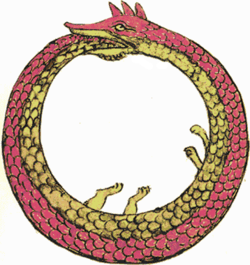- The ouroboros
- The "endless knot," a symbol of eternity used in Tibetan Buddhism.
- Infinity symbol variations
- Jacopo da Sellaio, Triumph of Eternity, 1485–1490
| Time |
|---|
 |
Eternity, [a] also referred to as sempiternity [b] [7] or forever, [c] is time with no end [10] i.e. infinite. [11]
Contents
- Philosophy
- Religion
- Physics
- Symbolism
- See also
- Notes
- References
- Works cited
- Further reading
- External links
In the context of human life, eternity and death are co-existing realities. [12] [13] [14]






